Tidbits - February 22, 2018 - Reader Comments: Blood on their Hands - NRA, Trump, Congress, GOP; Trump Military Budget; Israel; CIA; Who Does NRA Own; Events notice; Resources; and more....
Portside
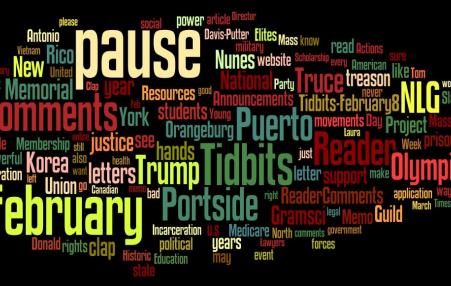 Reader Comments: Nunes Memo - Big Dud; Puerto Rico - many still without power; Union Membership Growth...Amidst Decline; Medicare for All - Canadian Readers Tell Their Story; Teaching Slavery; Antonio Gramsci; Trump's Military Parade - in song; Olympic Truce Actions; Cuba's Historic Literacy Campaign; The Puerto Rican Socialist Party; Scholarships for Young Activists; 50th Anniversary of the Orangeburg Massacre; and more....
Reader Comments: Nunes Memo - Big Dud; Puerto Rico - many still without power; Union Membership Growth...Amidst Decline; Medicare for All - Canadian Readers Tell Their Story; Teaching Slavery; Antonio Gramsci; Trump's Military Parade - in song; Olympic Truce Actions; Cuba's Historic Literacy Campaign; The Puerto Rican Socialist Party; Scholarships for Young Activists; 50th Anniversary of the Orangeburg Massacre; and more....
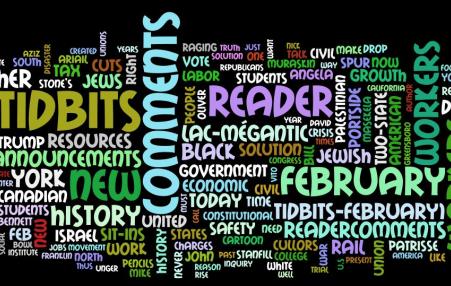 Reader Comments: Constitutional Crisis - Trump vs. Truth; Tax Cuts Don't Spur Growth; Need to Drop All New Charges Against Lac-Mégantic Workers; Immigration - and Norwegians; Hugh Masekela; 'Two-state Solution'; Young Workers - Largest Union Gain; Football; Announcements: Jews in American Labor ; Bill Fletcher in Bay Area; Angela Davis, Patrisse Cullors in New York; Students' Right to Vote; Today in history - start of the sit-ins; and more....
Reader Comments: Constitutional Crisis - Trump vs. Truth; Tax Cuts Don't Spur Growth; Need to Drop All New Charges Against Lac-Mégantic Workers; Immigration - and Norwegians; Hugh Masekela; 'Two-state Solution'; Young Workers - Largest Union Gain; Football; Announcements: Jews in American Labor ; Bill Fletcher in Bay Area; Angela Davis, Patrisse Cullors in New York; Students' Right to Vote; Today in history - start of the sit-ins; and more....
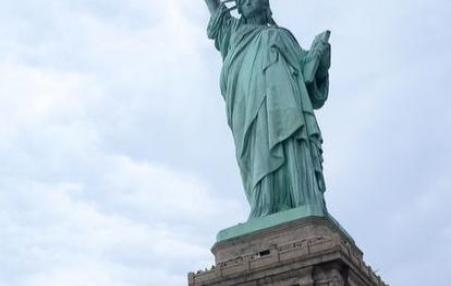 There were no federal laws concerning immigration until 1924. When a massive influx of new immigrant groups came at the turn of the 20th century — Italians from Southern Europe and Jews from Eastern Europe — a backlash developed. A new law required for the first time that immigrants to the U.S. have visas, introducing the concept of “having papers” to American immigration policy.
There were no federal laws concerning immigration until 1924. When a massive influx of new immigrant groups came at the turn of the 20th century — Italians from Southern Europe and Jews from Eastern Europe — a backlash developed. A new law required for the first time that immigrants to the U.S. have visas, introducing the concept of “having papers” to American immigration policy.
 Reader Comments: Nuclear Disarmament - Again on the Agenda; Trump's Racism - recalling Martin Niemöller's dire warning in Nazi Germany; Radical lessons of Martin Luther King; #TimesUp; Traditional Labor Organizing - sharp disagreement with Portside Labor post; Sports in Colleges; Oprah - more disagreement with Portside posts; Grim Times in Austria; Announcements: The '60s-Years that Changed America; Concert for Puerto Rico; War or Peace with North Korea? and more....
Reader Comments: Nuclear Disarmament - Again on the Agenda; Trump's Racism - recalling Martin Niemöller's dire warning in Nazi Germany; Radical lessons of Martin Luther King; #TimesUp; Traditional Labor Organizing - sharp disagreement with Portside Labor post; Sports in Colleges; Oprah - more disagreement with Portside posts; Grim Times in Austria; Announcements: The '60s-Years that Changed America; Concert for Puerto Rico; War or Peace with North Korea? and more....
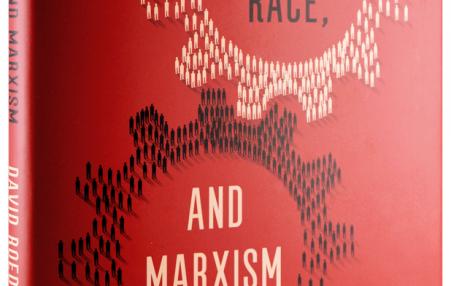 Shortly before his death, James Baldwin wrote that in the U.S., “White is a metaphor for power,” an observation that is deep background for much of the discussion in the masterly book under review, where race and class are intertwined, yet surface differences are used to split the labor force and maintain capital’s hegemony. The book can usefully inform debate on race and class and aid in reconstructing a revolutionary project in the context of Trumpworld.
Shortly before his death, James Baldwin wrote that in the U.S., “White is a metaphor for power,” an observation that is deep background for much of the discussion in the masterly book under review, where race and class are intertwined, yet surface differences are used to split the labor force and maintain capital’s hegemony. The book can usefully inform debate on race and class and aid in reconstructing a revolutionary project in the context of Trumpworld.
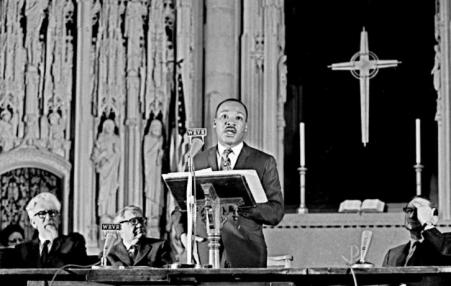 Martin Luther King, Jr.’s speech against the Vietnam War on April 4, 1967 at Riverside Church in New York one of the most profound and important speeches in American history. Without question, King’s speech in April helped to energize the anti-war movement and, through his profound moral analysis, in defining the degenerate role of the US in that war. It also helped to topple a sitting U.S. president - a profound lesson for us today.
Martin Luther King, Jr.’s speech against the Vietnam War on April 4, 1967 at Riverside Church in New York one of the most profound and important speeches in American history. Without question, King’s speech in April helped to energize the anti-war movement and, through his profound moral analysis, in defining the degenerate role of the US in that war. It also helped to topple a sitting U.S. president - a profound lesson for us today.
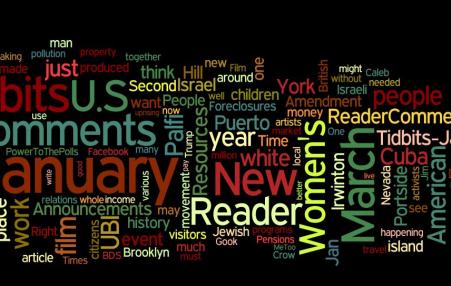 Reader Comments: Puerto Rican Foreclosures; Israeli Teens Refuse Army; Israel Bans BDS Supporters; Worker Safety; Pension; Free Market; Settler Colonialism and the Second Amendment; Nuclear Testing; Pollution from U.S. Military Bases - in our country; U.S. history - Jim Crow South; Record Numbers Visit Cuba last year (from the U.S.); Women's March 2018 - January 20; Resources, Announcements; and more.....
Reader Comments: Puerto Rican Foreclosures; Israeli Teens Refuse Army; Israel Bans BDS Supporters; Worker Safety; Pension; Free Market; Settler Colonialism and the Second Amendment; Nuclear Testing; Pollution from U.S. Military Bases - in our country; U.S. history - Jim Crow South; Record Numbers Visit Cuba last year (from the U.S.); Women's March 2018 - January 20; Resources, Announcements; and more.....
Spread the word